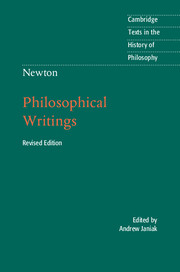Book contents
- Frontmatter
- Contents
- Acknowledgments
- Introduction
- Chronology
- Further reading
- Note on texts and translations
- I “New Theory about Light and Colours”
- II Correspondence with Robert Boyle [1679]
- III De Gravitatione [date unknown]
- IV The Principia [1687, first edition]
- V “An Account of the System of the World”
- VI Correspondence with Richard Bentley [1691–3]
- VII Correspondence with G. W. Leibniz [1693/1712]
- VIII Correspondence with Roger Cotes [1713]
- IX An Account of the Book Entitled Commercium Epistolicum [1715]
- X Queries to the Opticks [1721]
- Index
- References
Introduction
Published online by Cambridge University Press: 05 August 2014
- Frontmatter
- Contents
- Acknowledgments
- Introduction
- Chronology
- Further reading
- Note on texts and translations
- I “New Theory about Light and Colours”
- II Correspondence with Robert Boyle [1679]
- III De Gravitatione [date unknown]
- IV The Principia [1687, first edition]
- V “An Account of the System of the World”
- VI Correspondence with Richard Bentley [1691–3]
- VII Correspondence with G. W. Leibniz [1693/1712]
- VIII Correspondence with Roger Cotes [1713]
- IX An Account of the Book Entitled Commercium Epistolicum [1715]
- X Queries to the Opticks [1721]
- Index
- References
Summary
In the preceding books I have presented principles of philosophy that are not, however, philosophical but strictly mathematical - that is, those on which the study of philosophy can be based. These principles are the laws and conditions of motions and of forces, which especially relate to philosophy. But in order to prevent these principles from becoming sterile, I have illustrated them with some philosophical scholia, treating topics that are general and that seem to be the most fundamental for philosophy, such as the density and resistance of bodies, spaces void of bodies, and the motion of light and sounds. It still remains for us to exhibit the system of the world from these same principles.
… to treat of God from phenomena is certainly a part of natural philosophy.
– Isaac NewtonNewton as natural philosopher
Isaac Newton’s influence is ubiquitous 300 years after his death. We employ Newtonian mechanics in a wide range of cases, students worldwide learn the calculus that he co-discovered with Leibniz, and the law of universal gravitation characterizes what is still considered a fundamental force. Indeed, the idea that a force can be “fundamental,” irreducible to any other force or phenomenon in nature, is largely due to Newton, and still has currency in the twenty-first century. Remarkably, Newton’s status as a theorist of motion and of forces, and his work as a mathematician, is equaled by his status as an unparalleled experimentalist.
- Type
- Chapter
- Information
- Newton: Philosophical Writings , pp. vii - xxxvPublisher: Cambridge University PressPrint publication year: 2014

